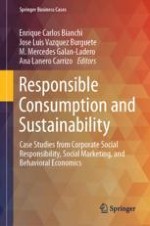This book presents high-quality cases on the actions carried out by companies to minimize the social and environmental impact of the products (goods and services) they launch on the market. It also highlights the education campaigns that promote behavioral changes and new sustainable lifestyles that have been developed by all kinds of organizations (Public Administration, NGOs, and businesses), mainly from Corporate Social Responsibility, Social Marketing, and Behavioral Economics perspectives. International cases help students learn how management and corporate strategy, and the appropriate marketing strategies, can be designed with an aim to achieve responsible consumption and create sustainable lifestyles.
